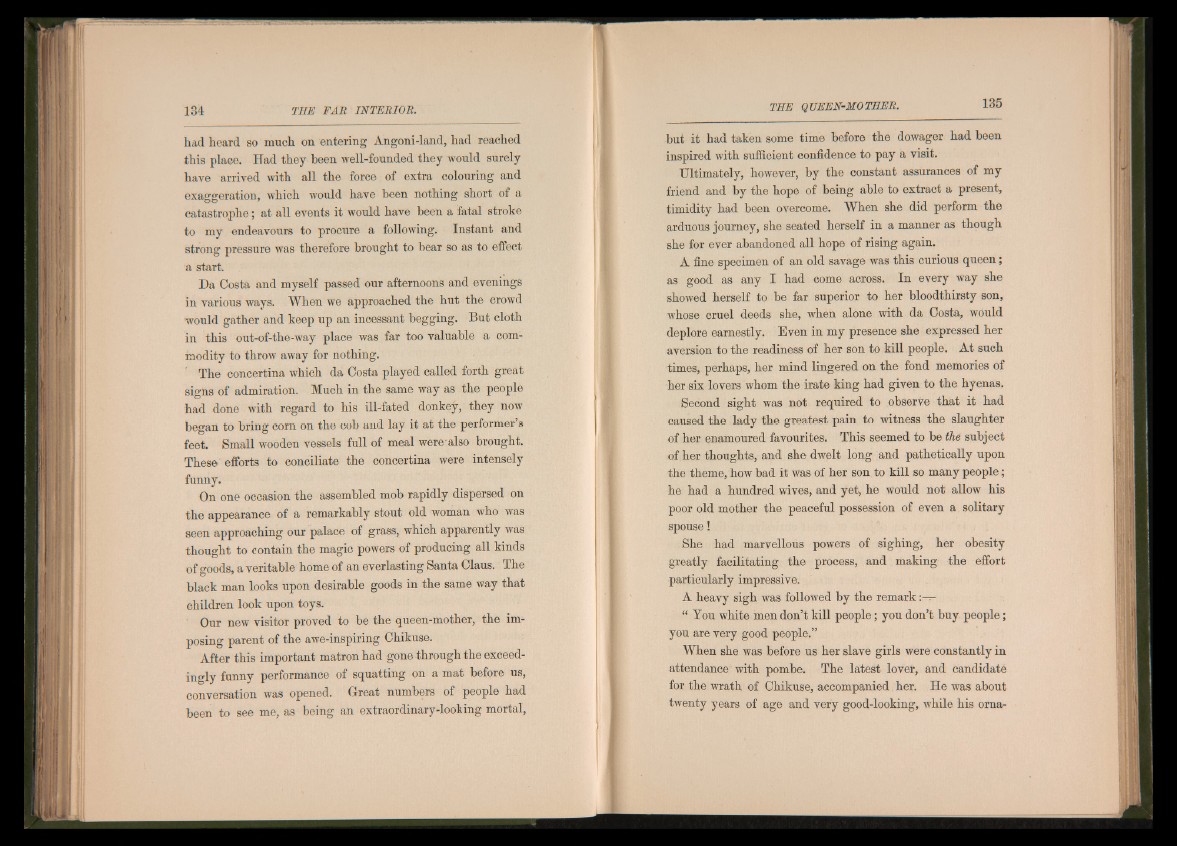
had heard so much on entering Angoni-land, had reached
this place. Had they been well-founded they would surely
haye arrived with all the force of extra colouring and
exaggeration, which would have been nothing short of a
catastrophe; at all events it would have been a fatal stroke
to my endeavours to procure a following. Instant and
strong pressure was therefore brought to bear so as to effect
a start.
Da Costa and myself passed our afternoons and evenings
in various ways. When we approached the hut the crowd
would gather and keep up an incessant begging. But cloth
in this out-of-the-way place was far too valuable a commodity
to throw away for nothing.
The concertina which da Costa played called forth great
signs of admiration. Much in the same way as the people
had done with regard to his ill-fated donkey, they now
besran to bring1 corn on the cob and lay it at the performer s O o
feet. Small wooden vessels full of meal were also brought.
These efforts to conciliate the concertina were intensely
funny.
On one occasion the assembled mob rapidly dispersed on
the appearance of a remarkably stout old woman who was
seen approaching our palace of grass, which apparently was
thought to contain the magic powers of producing all kinds
of goods, a veritable home of an everlasting Santa Claus. The
black man looks upon desirable goods in the same way that
children look upon toys.
Our new visitor proved to be the queen-mother, the imposing
parent of the awe-inspiring Chikuse.
After this important matron had gone through the exceedingly
funny performance of squatting on a mat before us,
conversation was opened. Great numbers of people had
been to see me, as being an extraordinary-looi ing mortal,
but it had taken some time before the dowager had been
inspired with sufficient confidence to pay a visit.
Ultimately, however, by the constant assurances of my
friend and by the hope of being able to extract a present,
timidity had been overcome. When she did perform the
arduous journey, she seated herself in a manner as though
she for ever abandoned all hope of rising again.
A fine specimen of an old savage was this curious queen;
as good as any I had come across. In every way she
showed herself to be far superior to her bloodthirsty son,
whose cruel deeds she, when alone with da Costa, would
deplore earnestly. Even in my presence she expressed her
aversion to the readiness of her son to kill people. At such
times, perhaps, her mind lingered on the fond memories of
her six lovers whom the irate king had given to the hyenas.
Second sight was not required to observe that it had
caused the lady the greatest pain to witness the slaughter
of her enamoured favourites. This seemed to be the subject
of her thoughts, and she dwelt long and pathetically upon
the theme, how bad it was of her son to kill so many people;
he had a hundred wives, and yet, he would not allow his
poor old mother the peaceful possession of even a solitary
spouse!
She had marvellous powers of sighing, her obesity
greatly facilitating the process, and making the effort
particularly impressive.
A heavy sigh was followed by the remark
“ You white men don’t kill people; you don’t buy people;
you are very good people.”
When she was before us her slave girls were constantly in
attendance with pombe. The latest lover, and candidate
for the wrath of Chikuse, accompanied her. He was about
twenty years of age and very good-looking, while his orna